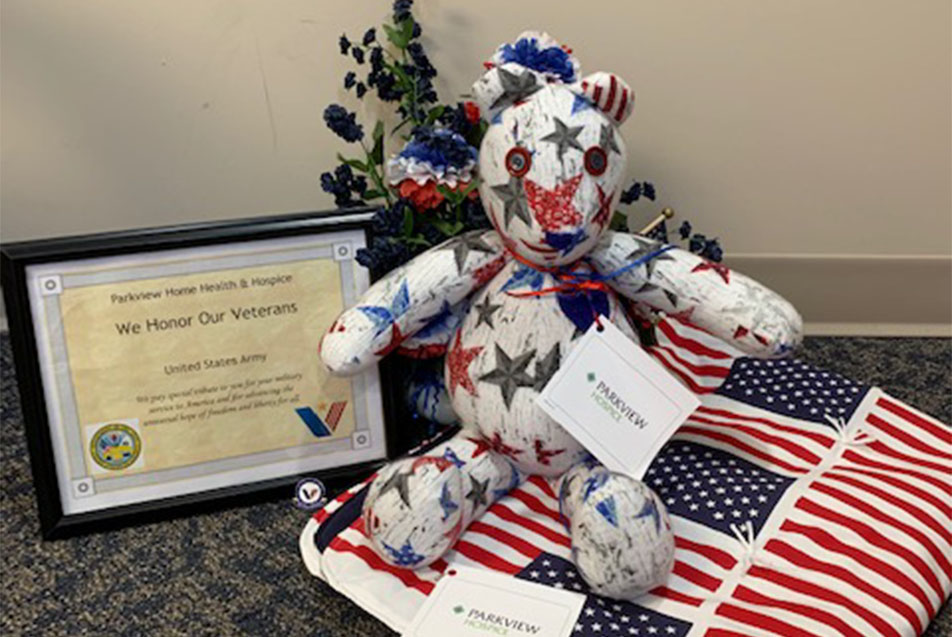
The cornerstones of hospice are providing patients and their loved ones with compassionate care and emotional support as they approach the end stages of life. With individualized care plans, many are genuinely able to make the most of the time they have left. For Dean and Marilyn Rittenhouse, that meant opting for in-home hospice care focused on keeping Dean comfortable while celebrating his military service. Marilyn recently shared the details of their journey and the exceptional care they received.
Dean and Marilyn
Dean and I were married for 50 years as of February 14 of this year. The Lord blessed us with two sons and three grandchildren. Dean was the kind of person who never knew a stranger. He enjoyed making people laugh and loved to talk. He was such a talker.
He loved to bowl, too. In fact, that’s how we met. My brother and Dean bowled together in the same league. One day, my brother came to me and said, ‘Sis, I think I know somebody you could date.’ That’s it, that’s how we met, through my brother, the matchmaker.
As for Dean’s military career, he was in the Air Force for four years. He loved the military and was quite proud that he was a veteran. He was stationed anywhere from Turkey to South Dakota and various places in between.
Dean was also a proud volunteer for the American Red Cross. For several years, he transported veterans to and from doctor's appointments. He loved everything about that job, especially meeting new people.
Dean’s fight
In 2018, Dean was diagnosed with lymphoma. He went through chemotherapy, but it wasn’t working, so we decided to do radiation as well. Then, between chemotherapy and radiation, the treatment worked. Dean was in remission and cancer-free by July of 2019.
With that news, we went to Florida. While we were there, however, Dean found a node in his abdomen. The doctor ordered a PET scan so we would know for sure what was going on. The scan verified that Dean’s cancer was back. We had the biopsy done in Florida, but Dean insisted on going back home, to Fort Wane, for treatment with Praveen Kollipara, MD, Fort Wayne Medical Oncology & Hematology. Dean liked Dr. Kollipara because he was there from the start. He had been through it all with us before.
So, we came back to Fort Wayne on February 1, 2020. We saw Dr. Kollipara on February 3 and started chemotherapy that same day. We did a PET scan after each round of chemotherapy, but it showed progression of the disease every time. We did four different chemotherapy types, trying to find the right combination to stop the cancer, but nothing worked.
Finally, Dr. Kollipara suggested that Dean’s best option was to stop putting himself through the chemotherapy and instead go home and enjoy the life he had left. With this advice, we went to Montana to see our son. When we came back, Dean knew what he wanted to do. ‘Okay, I guess I’m ready to go. Let’s call hospice to get the process started.’ Later, our hospice nurse, Danielle, came to the house to start the conversation to begin Dean’s in-home hospice care.
You know, I was an oncology nurse for over 20 years. Even though Danielle explained everything to us and I worked in the field and saw patients all the time, it’s not the same. It’s different when it’s your own family.
Hopes and expectations
My biggest concern was that he would pass in peace. Dean would always say, ‘I don’t know how to die.’ I would always tell him that nobody does. No one can answer that question for you. But my goal was to make sure he would be comfortable and feel at peace.
Thanks to our hospice nurse, Danielle, and our aide, Nikki, he had that. Both were fantastic. They kept us informed and explained everything thoroughly. They were always very concerned with Dean’s comfort. They took excellent care of him, and I will always be grateful for that.
Honoring those who have served
Parkview’s veteran pinning program allows hospice staff the chance to thank veteran patients. It’s one way to honor them and show respect for their military service. Before COVID-19, Parkview Hospice would have a volunteer veteran physically visit the patient, conduct the ceremony and perform the pinning in person. Once the pandemic hit, the hospice care team decided to do the next best thing: a virtual pinning ceremony.
During the virtual pinning ceremony, a volunteer veteran will set up an online meeting for the patient and their families. Before the ceremony begins, the hospice care nurse will get the veteran patient prepared for the pinning. The veteran volunteer will conduct the ceremony virtually. At the same time, the nurse will award the patient with a framed certificate thanking them for their years of service, a veteran lapel pin, a patriotic lap blanket and a Burden Buddy Bear. Finally, all veterans participating in the ceremony will salute, signaling the closing of the program.
What the ceremony meant to Marilyn and Dean
It meant a lot to both of us, but I think it meant so much more to Dean. My favorite part of the program was the My Burden Buddy Bear and the poem that came with it:
I’m not a fancy buddy. I’m rather plain and small.
Someone who likes you said that I should come to call.
I welcome all your kisses and all your love as well.
Your private wishes are safe with me, as I promise not to tell.
Hug me close to you, or set me on a shelf,
And when you feel discouraged, I will do my best to help.
Squeeze me tight and hold me, your secrets we can share,
I may not have the answers, but for you, I will be there.
I’ve been sent her on a mission to complete a simpler task,
So anything you need from me, all you do is ask.
I will comfort and rest with you as you sleep the whole night through,
When morning breaks and the sun shines in, we’ll celebrate anew.
Whoever wrote that poem put a lot of thought into it and did an excellent job. Dean was always very proud of being a veteran, and this ceremony was the perfect way to honor him, his life and military service.



